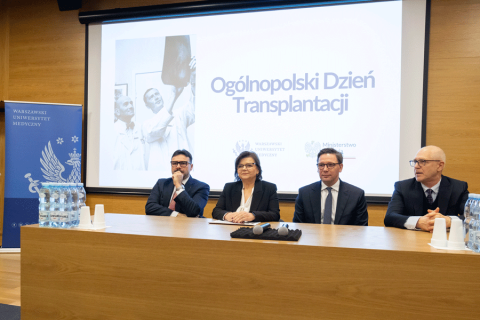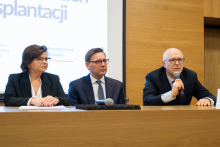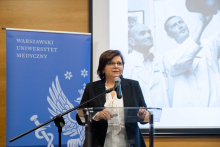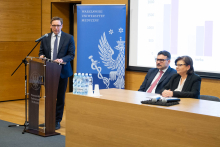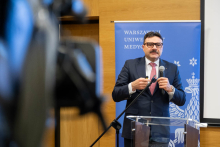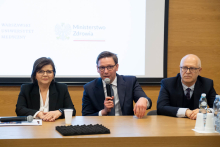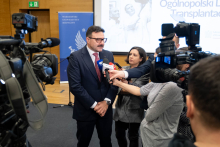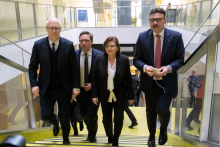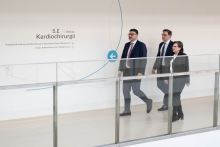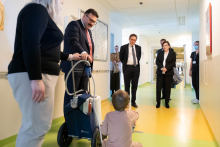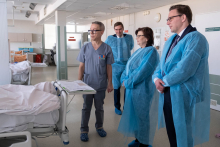The conference was held on the occasion of National Transplantation Day, which is celebrated on January 26, the anniversary of Poland's first successful kidney transplantation. It was carried out in 1966 by the teams led by Prof. Jan Nielubowicz and Prof. Tadeusz Orłowski at the First Surgical Clinic of the Medical Academy. The procedure is considered a milestone in the development of Polish transplantology.
- I am extremely pleased and would like to thank the Minister for her willingness to organize such a conference on the day we celebrate the anniversary of the first transplantation at our university. We perceive this as an expression of acceptance and support for our multidirectional efforts to increase the number of transplants and improve the conditions in which they take place. Our center is the largest in Poland, with a very high number of transplants, but this number is not the most important thing. The most important thing is that we try to do it as well as possible and use as many organs as possible, even those very difficult to transplant. And for this I want to thank immensely all the transplantation teams that work at our university in the University Clinical Center MUW - said Prof. Rafal Krenke, Rector of WUM, during the conference.
2024 a very good year in Polish transplantology
22% more transplants were performed in 2024 compared to 2023, a total of almost 2,200 people who received a chance for a second life. As Minister Izabela Leszczyna emphasized after the decline in transplants performed related to the coronavirus pandemic, the growth rate in transplantation in our country since 2022 has been impressive. In 2024, transplants were performed at transplant centers operating nationwide: 1132 kidneys (973 in 2023), 615 livers (523 in 2023), 201 hearts (179 in 2023), 147 lungs (98 in 2023).
- Through the professors, I thank all the doctors who save people's lives thorugh transplants all over Poland. I also thank all the medical staff, the nurses, everyone who is involved. And in a special way, I also want to thank the coordinators who are the good spirits of this whole extremely complicated process, in which, when we can no longer save one life, we have the chance to save another. And from the bottom of my heart, I thank the families who, knowing that they cannot save the one they love, decide to give life to a complete stranger whom they may never see in their lives. This is an extremely difficult moment, but a very beautiful one. And to all those who make such a decision, because without you there would be no transplantology - said Minister Izabela Leszczyna.
The minister also highlighted the ministry's efforts to financially support Polish transplantation medicine, including, among other things, equipping and training coordinators, subsidizing infrastructure and purchasing equipment for hospitals, which will be possible thanks to the PLN 100 million allocated for these purposes under the National Transplantation Program.
A revolution in liver transplantation
Saving or prolonging patients' lives with transplants requires very complex procedures, with a very high workload and using modern technology. However, this is very difficult due to the insufficient number of organs.
- All over the world, transplantation and the desire to help patients is limited by the unavailability of organs - explained Professor Michał Grąt, Head of the Department of General, Transplant and Liver Surgery UCC MUW - Here, every number, every increase by one, by two, by 100, are chances for patients to save their lives. That's why these numbers are extremely important, they entail an increase in quality.
To cope with this shortage, liver transplantologists at MUW are introducing state-of-the-art transplantation techniques. Last year, a team led by Prof. Michał Grąt performed the world's first supportive liver transplantation in a patient after her own organ was injured in a traffic accident. By using the regenerative capacity of the remaining fragment of the patient's own liver, with the temporary support of a transplanted fragment of a deceased donor liver, the patient avoided transplantation of the entire organ, and left the hospital with her own healthy liver.
Last October, after 20 years, the department resumed a program to transplant right liver segments from a living donor for adult recipients. So far, four such operations have already been performed, and more patients are waiting for the procedures. Specialists are also developing transplant oncology, because for many cancers liver transplantation has become the primary method of oncological treatment. Professor Grąt also recalled the modern methods of extracorporeal liver perfusion, which the Ministry of Health is funding under the National Transplant Program.
- We have already performed dozens of procedures to prepare the organ for transplantation, which increase the safety of the patient and are slowly becoming a standard in the world - said Prof. Grąt.
What other important things have happened in liver transplantation at our department? It is worth mentioning the development of international cooperation, which has resulted in the procurement of dozens of organs abroad, for which there were no recipients in particular European countries.
Finally, Prof. Grąt presented important data:
- There used to be about 300 liver transplants a year in Poland, but now 310 liver transplants have been performed at our department alone, and we have probably become the world's largest deceased donor liver transplant center for adult recipients. And thanks to the good atmosphere around transplantation, thanks to the public's support and advocacy of transplantation, thanks to the support of government bodies, we can save patients' lives.
UCC MUW as a strong center for heart transplantation and multi-organ transplantation
Seven centers across Poland involved in heart transplantation performed 201 transplants of this organ in 2024. At UCC MUW alone, 33 of them were performed, making our center the third largest in number performing these procedures.
- These are centers that cover 100% of our country's demand - said Prof. Mariusz Kuśmierczyk, Head of the Department of Heart, Thoracic and Transplant Surgery UCC MUW - With the launch of the heart program at UCK WUM, we have increased the number of heart transplants in Poland. Also, in my opinion, this is a huge success, not only for me, but also for all colleagues, the management, the rectoral authorities, all those who have contributed to this success.
As Prof. Mariusz Kuśmierczyk emphasized, UCC MUW is a special center not only because as many as 1/3 of all transplants in Poland are performed there, but also because multi-organ transplants are performed, such as heart with liver or liver with kidney. The last such procedure took place on December 25 last year, when our specialists performed a heart-kidney transplant, giving a chance to a patient with severe heart failure additionally requiring dialysis. Professor Kuśmierczyk is also pleased by the number of lung transplants in Poland, which has increased by at least 50% from 2023, with nine performed at UCC MUW alone.
- Imagine that just a year ago doctors from other countries, such as Austria, were flying in for lungs, while at the moment it is we who are flying to other countries to get lungs for our patients - Prof. Kuśmierczyk said.
As in liver transplantation, in heart transplants specialists also have new technologies at their disposal to help increase donor numbers. A team from the Department of Heart, Thoracic and Transplant Surgery UCC MUW is using an advanced OCS perfusion and monitoring system to keep a donated heart out of the body, in a metabolically active state, for up to 12 hours.
- Last year we performed six transplants using this system. And probably thanks to this system, the number of transplants in Poland is higher by these six, because we took hearts that were not normally suitable for transplantation. This is a system that transports a beating heart, but also provides all the substances needed for the normal functioning of that heart and for an accurate assessment of whether the heart is suitable for transplantation - explained Prof. Kuśmierczyk, and stressed that the risk associated with transplantation is reduced to 5% thanks to this system.
UCC MUW is a pioneer in the use of this technology, and the department's team has received very specialized training in its use. The system is an opportunity for more patients, as it allows to increase the pool of donors, as well as the pool of recipients, as hearts are now also being transplanted into patients over 60 years of age. Finally, Professor Kuśmierczyk pointed to the issue of pediatric transplants, which will be needed more and more due to the large population of children aged 12-15 with heart defects who will need transplants in the future.
